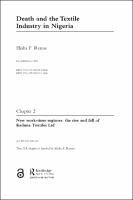Chapter 2 New work-time regimes
Proposal review
the rise and fall of Kaduna Textiles Ltd
Abstract
The production of manufactured textiles at the Kaduna Textile Limited mill was an important development which led to the employment of many men from the small ethnic groups in southern Kaduna and Middle Belt states. The KTL Handbook, which workers received, laid out work rules which emphasized the importance of being on time. This aspect of industrial labor—the importance of keeping to time with clocks and watches—differed from many workers’ earlier experience of agricultural work. Yet despite KTL workers’ acceptance of the new work and time regime, the closure of the mill due to irregular electricity, antiquated equipment, and lack of government support led many to return to agricultural labor or to service employment in the city. For those preferring to remain in Kaduna, the difficulties of living without regular income and access to food and health care has contributed to the many health problems experienced by former KTL workers and their subsequent deaths.
Keywords
burying, cemeteries, chapter, children, city, closure, coalition, colonial, conclusion, consequences, construct, dead, death, deaths, deindustrialization, dilemmas, elisha, experiences, fall, families, hardship, health, hometowns, houses, industry, introduction, kaduna, ktl, ltd, new, nigeria, p, problems, regimes, renne, rise, textile, textiles, time, unpaid, widows', work, workers.ISBN
9780367465520, 9780367524906Publisher
Taylor & FrancisPublisher website
https://taylorandfrancis.com/Publication date and place
2021Imprint
RoutledgeClassification
African history


 Download
Download Web Shop
Web Shop